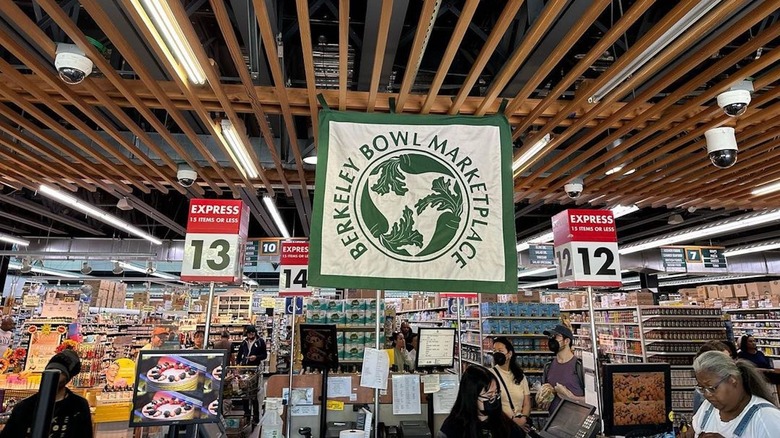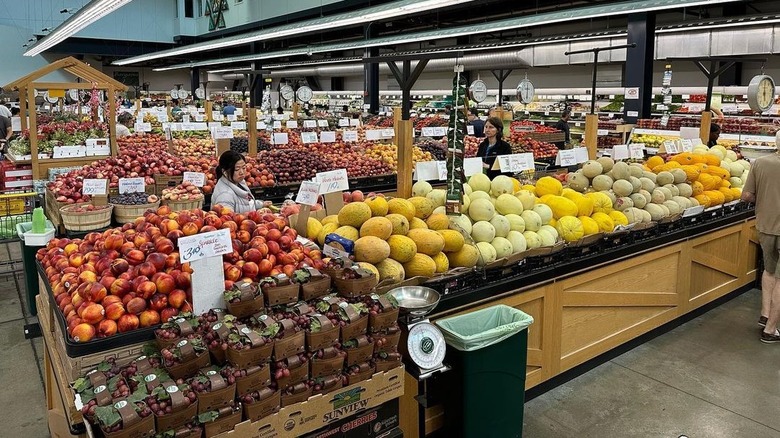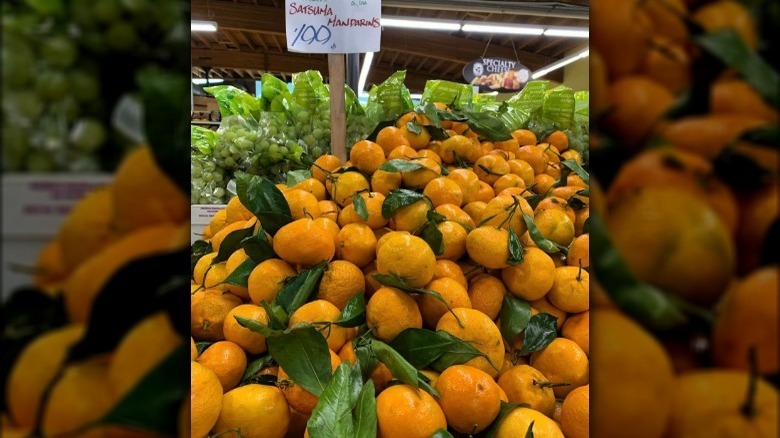The Berkeley Grocery Store That Went From A Bowling Alley To A Produce Hub
It's always interesting to hear about unique grocery store locations — such as the stunning Trader Joe's tucked inside an old movie theater — and Berkeley, California, just so happens to be home to one that has a memorable origin story.
As it turns out, Berkeley Bowl gets its name from the type of building it used to be: a bowling alley. Back in 1977, founder Glen Yasuda acquired the building that Berkeley Bowl, the bowling alley, had been in, and turned it into a local grocery store with the help of his wife, Diane. He decided to keep the name, and the store sign, to appeal to the students in the college town. Nowadays, the store is often referred to simply as The Bowl by Berkeley residents.
Berkeley Bowl eventually moved out of the former bowling alley in 1999 to move into a bigger space — a building that had formerly been another grocery store, Safeway. Ten years later, they opened up a second location in the city, known as Berkeley Bowl West, in a building that had formerly been a Heinz Ketchup factory, thus keeping up the tradition of housing the grocery store in locations with interesting history.
Berkeley Bowl is known for its vast and affordable produce selection
Berkeley Bowl isn't just known for its fascinating origin story, it's also known for being a high-quality option for grocery shopping — specifically, it's known for its vast and affordable produce selection. Founder Glen Yasuda, who died in February 2020, would get up at 2:30 a.m. each day to pick out the produce himself, determined to offer his customers a diverse range of produce, typically carrying about 3,000 different items at a time. In fact, the produce sections of both stores have been described as double or triple the size of the average grocery store's produce department.
After Yasuda's death, Alex Hozven, a business owner who sold produce to Berkeley Bowl, told SF Chronicle, "[Yasuda] introduced people to so much. It wasn't just, 'I'm going to get potatoes.' It was, 'I'm going to choose between 20 types of potatoes.' I think that was new in people's conception of possibility," According to SF Chronicle, you can also find rare produce items, such as epazote leaves or long burdock roots.
Berkeley Bowl cashiers go through a rigorous training process
At Berkeley Bowl, the staff members are also experts in the produce department. The four-week training process to be a cashier is a vigorous one — and not everyone who is initially hired makes it through to becoming an official cashier. According to SF Gate, cashiers must start by memorizing the "Top 100" most-purchased items by customers; after a week, they're tested on it.
If you pass the test, the next step of the process is to spend a week in the produce section learning the differences between each variety of fruit or vegetable. The potential cashiers also spend time learning the "language" of the produce codes (which will eventually go into a code book, designed by each cashier individually to organize them in the best way that works for them). The next step of the training process is a test in which the trainee has 15 minutes to go through the checkout process with 25 items in front of a manager. If the trainee passes that, then they go through a two-week trial period as a cashier under a supervisor's eye.
Berkeley Bowl project manager Chi Dixon spoke about the store's vast selection — and how that translates to a big responsibility to each of the cashiers — to SF Gate, stating, "We have one of the biggest selections of produce that you'll find. ... It's phenomenal and can be completely overwhelming, but you know, that's what we do and that's what our reputation is built on."


